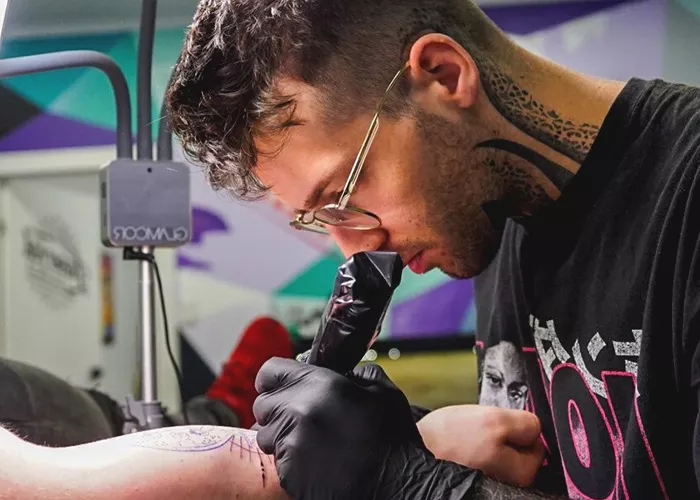Tattoo artists are expressing frustration over the increasing use of artificial intelligence (AI) in their field, with many likening it to “doing sports on steroids” — a shortcut that undermines the art form’s integrity. As AI tools gain popularity in various industries, they are now making their way into the tattoo world, raising concerns among tattoo professionals about the future of their craft.
For years, the design process has been an integral part of a tattoo artist’s job, involving creativity, skill, and a personal touch that results in custom pieces for each client. However, with the rise of AI design programs, this process is being rapidly automated, and some artists feel the technology is taking over their industry.
“It just outperforms people,” said Ziggy Tramdaks, a tattoo artist, in an interview with the Wall Street Journal. He expressed his belief that AI will eventually dominate the tattoo industry whether artists want it or not. Many tattoo professionals share his sentiments, feeling that AI-generated designs could replace human creativity in the tattooing process.
Matt Doherty, a 41-year-old tattoo artist from Sicklerville, NJ, echoed Tramdaks’ concerns, stating, “It’s like doing sports on steroids,” referring to the potential of AI to overshadow traditional tattoo artistry. The technology is rapidly advancing, with AI tools like ChatGPT and others now capable of generating impressive tattoo designs in a matter of minutes, even for users with little to no technical knowledge.
Tattoo enthusiasts and aspiring clients are also taking notice. Various AI-driven programs allow users to type in descriptive keywords, and within moments, the software produces stunning, realistic mock-up designs. One such version of ChatGPT even tailors its capabilities specifically to tattoo design, offering users a streamlined way to generate their custom tattoos.
However, some customers feel that the personal and permanent nature of tattoos demands more than just an automated design. “I was in shock,” recalled Kaarina Vuorinen, a 30-year-old dental nurse from Helsinki, Finland, who experienced an unsettling revelation about her tattoo design. While getting a lower leg tattoo, her artist admitted that the design was AI-generated. “He was kind of proud. I was so disappointed,” Vuorinen said. Her experience highlights the concern that some clients may feel betrayed by the use of AI in a process they believe should be personal and human-driven.
In other cases, customers embracing AI-driven designs are sometimes left with unrealistic expectations. Tattoo artist Matthew Hatch shared an example where a client requested an intricate galaxy design generated by AI. According to Hatch, the outcome likely would have resembled “a gigantic bruise,” as the technology lacks the understanding of how to translate such designs to the skin effectively. Hatch noted that while AI can create impressive visuals, there are limitations to what can actually be tattooed on a human body.
Despite the allure of quick and stunning designs, the growing trend of AI-generated tattoo art raises important questions about the future of creativity and craftsmanship within the tattoo industry. For many artists, the personal touch, attention to detail, and human connection involved in tattoo design remain irreplaceable. While AI can undoubtedly enhance the design process, it also has the potential to diminish the uniqueness and artistry that has defined the tattoo world for generations.
As AI continues to evolve, tattoo artists face a crucial decision: adapt to the changing landscape or hold steadfast to the traditional principles that have shaped their profession. Regardless of where the industry ultimately heads, one thing is clear — the debate over AI in tattoo artistry is far from over.
Related topics:

